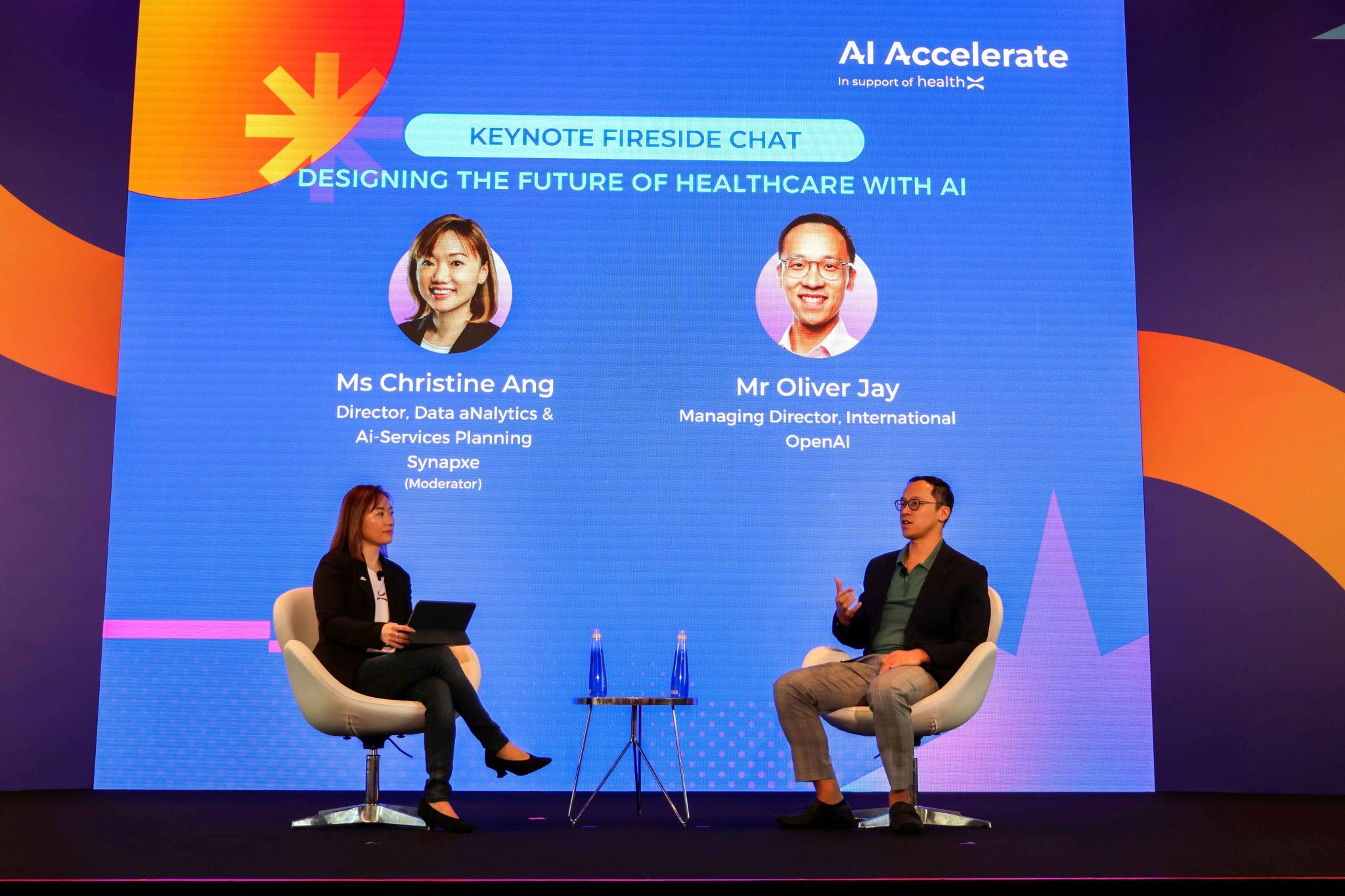Synapxe eyes AI agents and unveils platforms to scale system-wide innovation
By Si Ying Thian
Singapore’s national healthtech agency announced that it is planning to integrate agentic AI into the national Health Hub app, as well as a new regulatory sandbox to deploy emerging AI tech in all public healthcare institutions.

Public healthcare professionals who participated in Synapxe's GenAIus challenge programme, Health Minister Ong Ye Kung, and Synapxe's CEO Ngiam Siew Ying. Image: Synapxe
Synapxe’s inaugural AI Accelerate conference on Monday stressed the core message that one does not need to keep reinventing the wheel to scale innovations in healthcare.
Speaking at the conference, both Singapore’s Health Minister Ong Yee Kung and Synapxe’s CEO Ngiam Siew Ying underscored the need for robust foundations to not only enable - but also scale artificial intelligence (AI) across different public healthcare institutions.
-1750071411072.jpg)
Part of the key announcements made at the conference centred on Synapxe’s new partnerships with OpenAI, AIDX, Databricks, and Google.
These partnerships focused on integrating agentic AI into the HealthHub app, AI testing, leveraging interoperable data and AI services, and broader training initiatives.
“We will continue to invest in capabilities that power AI development securely, and also continue to shape a trusted space where innovation thrives hand in hand with safety, ethics and transparency,” said Ngiam during her opening remarks.
The conference also put a spotlight on minimum viable products (MVPs) that were co-created between public healthcare institutions and private sector partners during a challenge programme GenAIus launched by Synapxe last April.
Here are some of the key announcements made at the conference.
AI agents as the next leap
Synapxe would partner OpenAI to explore incorporating AI agents into various healthcare use cases.
“An AI agent is not just answering questions for you, but executing a task,” said OpenAI’s Managing Director for international markets, Oliver Jay, during a fireside chat, adding that agents could make healthcare more accessible.
The agency planned to use OpenAI's multi-agentic AI framework to create a more personalised and user-friendly conversational assistant within the national healthcare app Health Hub, making it easier for users to book appointments.
Booking a vaccination via AI agents might sound like a simple task, but he noted that each of the multiple steps involved - like finding a date, time, location, and confirming - could add friction for users.
Aside from agentic AI, Health Hub’s beta version has currently incorporated AI into its conversational assistant to allow users to ask health questions in multiple languages (English, Chinese, Malay and Tamil) through voice or text.
In an earlier media briefing, Synapxe also revealed plans to tap into local-language large language models (LLMs) AI Singapore's SEA-LION and A*Star's MERaLiON to expand the range of languages on Health Hub.

Health Hub AI, alongside its agentic AI feature, will launch later this year. The beta version is currently available for public feedback until the end of August.
Minister Ong also revealed plans to unify the different existing healthcare apps and leverage their potential to incorporate AI capabilities.
By 2027, the Ministry of Health would bring together the different cluster apps, like SingHealth’s Health Buddy, NHG Cares App, and NUHS App, into one unified platform to improve the accessibility of public healthcare services.
Open and interoperable platforms
Synapxe had earlier deployed two vital platforms across the whole of public healthcare, which served as robust foundations for the MVPs and private partnerships that were announced at the conference.
The platforms were cloud-based analytics platform HEALIX, which enabled secure sharing of anonymised data to train AI models; and secure GPT platform Tandem, which was designed to test, validate and scale GenAI applications from one setting to others.
Synapxe’s new partnerships with Databricks and Google also underlined its focus on open and interoperable AI solutions.
A recent coverage of Synapxe’s startup innovation sandbox also stated that the agency has availed over 2,300 healthcare APIs to developers to create interoperable solutions.
Minister Ong emphasised the ability of a strong foundation to enable the development of a range of use cases – many of them are created from ground-up and used in the hospital setting.
He cited the success of SingHealth’s Note Buddy, a GenAI tool that helps clinicians automate documentation, which was hosted on Tandem.
The tool has already assisted over 2,100 healthcare workers in SingHealth to create more than 16,000 medical and administrative records.
By the end of this year, this tool will be available to all other public healthcare institutions, he said.
Hitting both innovation and safety
A key foundation was a regulatory approach that accelerated innovation while maintaining robust patient safety.
Minister Ong announced that the Ministry was planning to set up a regulatory sandbox for AI software-as-medical devices (AI-SaMDs).
This sandbox would enable all public healthcare institutions to deploy AI devices without a manufacturer’s licence or product registration.
Once an AI solution was developed and implemented in one public hospital, the MOH Office for Healthcare Transformation (MOHT) or Synapxe, the solution could also be implemented across other public hospitals, he said.
“We will continue to ensure strong clinical governance, cybersecurity measures, and post-market surveillance post rollout of the AI solutions. If successful, we will explore extending the sandbox to private healthcare,” he added.